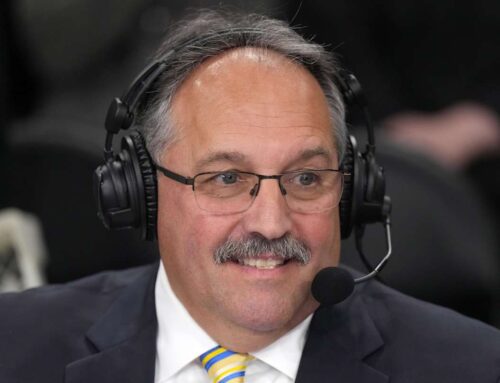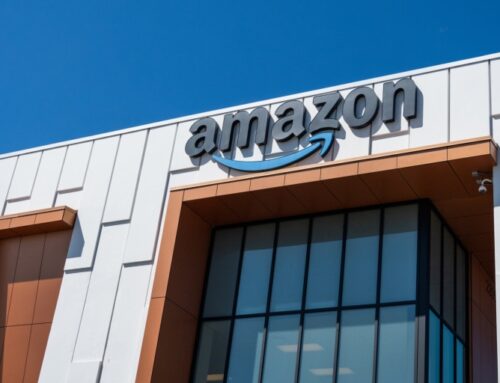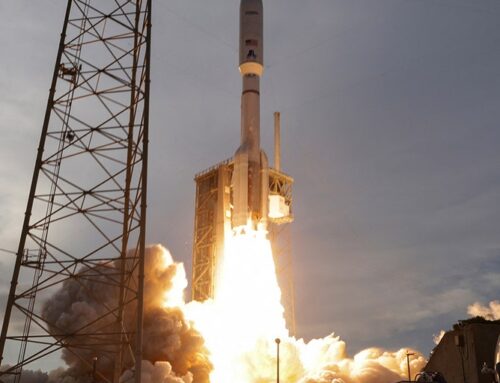Commentary: Trump’s next tariff war will be with your favorite store
April 29, 2025
President Trump’s tariffs on thousands of imported products will basically be an unnecessary surcharge making a lot of stuff more expensive. But Trump doesn’t want you to know that.
As the Trump tariffs snarl global supply chains, an inevitable brawl is brewing over how to explain the coming chaos to millions of American consumers. Retailers anticipate higher prices and product shortages by summer. The CEOs of Walmart, Target, and Home Depot told Trump as much during a recent meeting at the White House.
Trump, apparently, wants retailers to keep the source of the chaos a secret.
Amazon has reportedly been developing a plan to show the added cost of the Trump tariffs for affected products. After that news broke on April 29, the White House immediately attacked Amazon’s plan as a “hostile and political act,” as White House press secretary Karoline Leavitt called it. She pointed out that Amazon didn’t attribute higher prices to President Biden when inflation hit 9% in 2022.
Amazon said it was considering tariff disclaimers on its low-budget Haul app but not its main site. The online giant will doubtless desist now that Trump has taken notice.
But the problem isn’t going away, and the Amazon spat is a preview of a huge tariff blame game sure to erupt as the Trump tariffs do their dirty work.
Tariffs are inflationary by definition. They’re a consumption tax added to the cost of imports, and in some cases the price hikes will be dramatic. There’s currently a 145% tariff on most products from China, which will bring sharply higher prices for clothing, appliances, electronics, toys, and many other things. In some cases, the tariffs will be so high that importers will refuse to pay them, which means some inventories will simply run out.
Read more: The latest news and updates on Trump’s tariffs
An unmistakable lesson of the Biden-era inflation is that voters hate high prices and eventually punish whoever they think is responsible. Retailers don’t want the blame, which is why they routinely say they’re only passing on higher costs from their suppliers. Airlines list all the taxes applied to a ticket because they want you to know the government is responsible for a big part of the cost.
The Trump tariffs are unique in that they will be a sole-source cause of higher prices. Bidenflation, by contrast, was a confluence of several factors, such as COVID-era shortages and supply chain disruptions, along with overaggressive government stimulus. Maybe Biden and his team should have seen it coming, but they didn’t deliberately cause higher inflation and then stick with a failing policy while most economists told them it would fail.
When Trumpflation arrives in a few months, retailers will want their customers to know it isn’t their fault. But Trump has now signaled he’ll go after them if they blame higher prices on his tariffs. And Trump has shown he’ll use the full power of the federal government to punish adversaries.
Drop Rick Newman a note, follow him on Bluesky, or sign up for his newsletter.
Taken to an extreme, Trump could seek to punish CEOs for criticizing his tariffs in earnings calls and reports to shareholders. That would be ridiculous, given that public companies are obligated to be transparent about factors affecting costs and profitability. Yet it’s not beyond Trump to threaten and intimidate despite weak legal standing.
The tariff blame game will probably go something like this: Once price hikes become notable and consumers begin to balk, retailers will begin posting bland notices that lack the word “Trump” but point out that recent government policy changes have led to higher import costs. If retailers do this en masse, it will make it harder for Trump to target any particular chain for retribution. Small businesses integrated into communities will do the same through word of mouth and informal notices — the way many restaurants have added an egg surcharge to their menus.
Read more: $6 eggs and other inflation pain points: Here’s where prices are rising
It won’t take a lot of effort to explain to shoppers why prices are suddenly higher. Many surveys show that Americans are already highly aware of Trump’s tariffs and their likely effects. The University of Michigan’s monthly sentiment survey, as one example, recently found that consumers now have the highest inflation expectations since 1981. That is entirely because they expect Trump’s tariffs to raise prices. Virtually all the other inflationary pressures of the past three years have dissipated, and inflation expectations were falling until Trump took office.
Trump has one huge advantage Biden didn’t: He can simply cancel his tariffs, end the inflationary threat, and forego a battle with retailers over who’s to blame for consumer pain. Biden could have only wished for such an easy inflation exit ramp.
But Trump relishes a fight more than Biden did, and yet another one is almost certainly on the way.
Rick Newman is a senior columnist for Yahoo Finance. Follow him on Bluesky and X: @rickjnewman.
Read the latest financial and business news from Yahoo Finance
Terms and Privacy Policy
Search
RECENT PRESS RELEASES
Related Post





